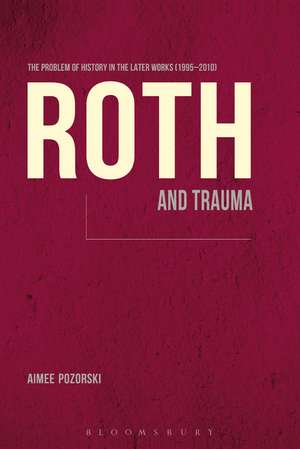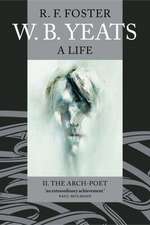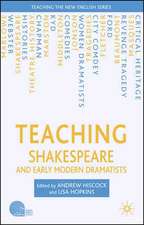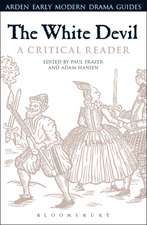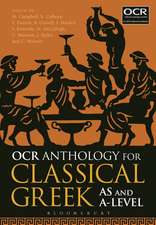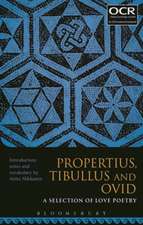Roth and Trauma: The Problem of History in the Later Works (1995-2010)
Autor Dr. Aimee Pozorskien Limba Engleză Paperback – 24 apr 2013
| Toate formatele și edițiile | Preț | Express |
|---|---|---|
| Paperback (1) | 255.76 lei 6-8 săpt. | |
| Bloomsbury Publishing – 24 apr 2013 | 255.76 lei 6-8 săpt. | |
| Hardback (1) | 770.94 lei 6-8 săpt. | |
| Bloomsbury Publishing – 14 sep 2011 | 770.94 lei 6-8 săpt. |
Preț: 255.76 lei
Preț vechi: 330.29 lei
-23% Nou
Puncte Express: 384
Preț estimativ în valută:
48.96€ • 53.19$ • 41.15£
48.96€ • 53.19$ • 41.15£
Carte tipărită la comandă
Livrare economică 21 aprilie-05 mai
Preluare comenzi: 021 569.72.76
Specificații
ISBN-13: 9781623563233
ISBN-10: 1623563232
Pagini: 192
Ilustrații: black & white illustrations
Dimensiuni: 138 x 216 x 10 mm
Greutate: 0.28 kg
Editura: Bloomsbury Publishing
Colecția Bloomsbury Academic
Locul publicării:New York, United States
ISBN-10: 1623563232
Pagini: 192
Ilustrații: black & white illustrations
Dimensiuni: 138 x 216 x 10 mm
Greutate: 0.28 kg
Editura: Bloomsbury Publishing
Colecția Bloomsbury Academic
Locul publicării:New York, United States
Caracteristici
Engages with an ongoing discussion among theorists about the difficulties of representing traumatic history.
Notă biografică
Aimee Pozorski is Associate Professor of English at Central Connecticut State University, USA, where she teaches contemporary literature and trauma theory. She is the current President of The Philip Roth Society.
Cuprins
PrefaceAcknowledgments 1. Roth and Trauma: The Problem of History in the Later Works2. "I pledge a legion to the flag": Drenka Balich's Malapropisms and the Traumatic Sublime of the Flag3. American Pastoral and the Traumatic Ideals of Democracy4. "The stars are indispensable": Trauma, Betrayal, and Celebrity in I Married a Communist5. Founding Traumas: Vietnam, Infanticide and The Iliad in The Human Stain6. Terror, Trauma, and "the mockery of Armageddon": The Dying Animal in the New Millennium7. Traumatic Realism, "Afterwardsness" and the Figure of the Child in The Plot Against America8. Exit Ghost: Mourning Zuckerman in the Age of Terror9. "the gravest meaning": Trauma and the Tetralogy of the GraveNotesWorks Cited Index
Recenzii
"With an engaging combination of personal warmth and scholarly comprehensiveness, as well as an ear attuned to the poetics of prose, Aimee Pozorski expands the horizons of critical discourse by reading the masterpieces of Philip Roth's late period as excavations of 'the darker secrets of American identity,' going back as far as the Revolutionary War. A sophisticated grasp of the temporality of traumatic experience sustains Pozorski as she bears witness to the cultural wounds laid bare in Roth's work." --Peter L. Rudnytsky, Professor of English, University of Florida, USA, and author of Rescuing Psychoanalysis from Freud and Other Essays in Re-Vision (2011)
"In a superb reappraisal of Philip Roth's later works, Aimee Pozorski argues in Roth and Trauma that, since 1995, the novels have conveyed a deeply historical view of the United States. Roth and Trauma sweeps away narrow readings focused on Roth as a Jew, as a self-contemplating postmodernist, and as an American preoccupied solely with the anxieties of the late twentieth century. Through lively, astute close readings of Roth's novels, and informed by the insights of trauma theory, Pozorski uncovers compelling evidence that Roth's preoccupation with the unforeseen in the later fiction bears witness to how past American traumas live into the present. Roth's representations of traumatic American history, Pozorski finds, are rooted in the founding of the nation and the ongoing failure of America to fulfill ideals of freedom and democracy. This passionate book will fundamentally change the way general readers and scholars think about Roth as an American writer." -- Debra Shostak, Professor of English, The College of Wooster, USA
"With her book Roth and Trauma, Aimee Pozorski raises the bar of Philip Roth studies. With detailed, penetrating, and vigorous readings of Roth's late fictions, she finds him to be a writer of broad sympathy, conceptual subtlety, and historical depth, whose instincts for American history are founded on extensive research. Her book is as insistent, passionate, and political as the Roth novels she rereads for us. Roth and Trauma is as graciously written as it is powerfully conceived. It will be read, and it will make a difference." -- Mark Shechner, Professor of English, University at Buffalo, State University of New York, USA
"In this original and engaging book, Aimee Pozorski opens up a fruitful new approach to Philip Roth's recent novels. She both puts Roth's oeuvre into dialogue with contemporary trauma theory and extends our sense of the historical reach and political promise of his late work. Roth and Trauma makes the provocative and convincing argument that we need to read beyond the events of the twentieth and twenty-first centuries and engage with American's traumatic origins if we want to understand the full significance of history in Roth's novels. Written in accessible and passionate prose, Pozorski's book will be of interest not only to admirers of Roth but also to students and scholars of trauma studies and contemporary literature." -- Michael Rothberg, Professor of English, University of Illinois at Urbana-Champaign, USA, author of Multidirectional Memory: Remembering the Holocaust in the Age of Decolonization
Roth and Trauma contributes to the ongoing conversation among critics who focus primarily on Roth's representation of Jewish American life, on the one hand, or on his representation of Post War II America, on the other hand. Pozorski's innovative approach to the significance of history in Roth's recent fiction from the perspective of trauma theory, and her passionate prose - an echo of Roth's own fervent engagement with the ideals and failures of America - will doubtless appeal not only to students and scholars of contemporary literature and trauma studies, but also to the general reader. Readers of this book will comprehend Roth - and through his fiction, contemporary America - in novel and creative ways.
"In a superb reappraisal of Philip Roth's later works, Aimee Pozorski argues in Roth and Trauma that, since 1995, the novels have conveyed a deeply historical view of the United States. Roth and Trauma sweeps away narrow readings focused on Roth as a Jew, as a self-contemplating postmodernist, and as an American preoccupied solely with the anxieties of the late twentieth century. Through lively, astute close readings of Roth's novels, and informed by the insights of trauma theory, Pozorski uncovers compelling evidence that Roth's preoccupation with the unforeseen in the later fiction bears witness to how past American traumas live into the present. Roth's representations of traumatic American history, Pozorski finds, are rooted in the founding of the nation and the ongoing failure of America to fulfill ideals of freedom and democracy. This passionate book will fundamentally change the way general readers and scholars think about Roth as an American writer." -- Debra Shostak, Professor of English, The College of Wooster, USA
"With her book Roth and Trauma, Aimee Pozorski raises the bar of Philip Roth studies. With detailed, penetrating, and vigorous readings of Roth's late fictions, she finds him to be a writer of broad sympathy, conceptual subtlety, and historical depth, whose instincts for American history are founded on extensive research. Her book is as insistent, passionate, and political as the Roth novels she rereads for us. Roth and Trauma is as graciously written as it is powerfully conceived. It will be read, and it will make a difference." -- Mark Shechner, Professor of English, University at Buffalo, State University of New York, USA
"In this original and engaging book, Aimee Pozorski opens up a fruitful new approach to Philip Roth's recent novels. She both puts Roth's oeuvre into dialogue with contemporary trauma theory and extends our sense of the historical reach and political promise of his late work. Roth and Trauma makes the provocative and convincing argument that we need to read beyond the events of the twentieth and twenty-first centuries and engage with American's traumatic origins if we want to understand the full significance of history in Roth's novels. Written in accessible and passionate prose, Pozorski's book will be of interest not only to admirers of Roth but also to students and scholars of trauma studies and contemporary literature." -- Michael Rothberg, Professor of English, University of Illinois at Urbana-Champaign, USA, author of Multidirectional Memory: Remembering the Holocaust in the Age of Decolonization
Roth and Trauma contributes to the ongoing conversation among critics who focus primarily on Roth's representation of Jewish American life, on the one hand, or on his representation of Post War II America, on the other hand. Pozorski's innovative approach to the significance of history in Roth's recent fiction from the perspective of trauma theory, and her passionate prose - an echo of Roth's own fervent engagement with the ideals and failures of America - will doubtless appeal not only to students and scholars of contemporary literature and trauma studies, but also to the general reader. Readers of this book will comprehend Roth - and through his fiction, contemporary America - in novel and creative ways.
